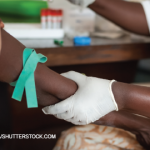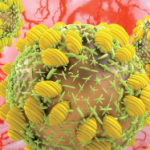Tenosynovitis can be seen in patients with Chikungunya infection, and about 5% of patients will experience symptoms that technically meet criteria for an autoimmune inflammatory arthritis, with a pattern most often looking like that of rheumatoid arthritis. In patients being evaluated for Chikungunya, clinicians should also consider the possibility of Zika and Dengue; this is specifically true for travelers to the Caribbean, South America and Southeast Asia.
Hepatitis
Dr. Calabrese moved on to describe how the discovery of hepatitis C virus (HCV) in 1989 changed the world of medicine. With regard to rheumatology, the discovery helped explain the cause of cryoglobulinemia in a large number of patients.
Keep the following in mind when evaluating patients for HCV:
- Patients being screened for HCV should also be evaluated for hepatitis B infection (HBV);
- All patients who are positive for HCV antibodies should be referred for HCV RNA testing via a Nucleic Acid Test (NAT) or Nucleic Acid Amplification Test (NAAT); and
- All patients with HCV should be treated to cure the disease.
With regard to the other most important form of viral hepatitis—HBV—there are about 300 million people worldwide living with chronic HBV infection. Screening for HBV is essential in the world of rheumatology because a risk of reactivation exists when patients are treated with immunosuppression, and this process of reactivation is preventable.
Screening for HBV can also indicate which patients should be referred for vaccination against HBV. The three tests that are important for screening include HBV core antibody, HBV surface antibody and HBV surface antigen testing. Proper interpretation of these lab results is essential for protecting patients, and an infectious disease specialist should be involved if questions arise.
HIV
Finally, Dr. Calabrese discussed human immunodeficiency virus (HIV), which previously was a major cause of mortality and morbidity but has been revolutionized by the advent of highly active anti-retroviral therapy (HAART). Some musculoskeletal and rheumatologic issues can still arise in patients with HIV, such as avascular necrosis, osteoporosis and immune reconstitution inflammatory syndrome (IRIS). In terms of reactive arthritis in patients with HIV infection, Dr. Calabrese noted that sacroiliitis and axial disease are uncommon, but psoriasis and psoriatic arthritis features can develop in patients.
 Jason Liebowitz, MD, is an assistant professor of medicine in the Division of Rheumatology at Columbia University Vagelos College of Physicians and Surgeons, New York.
Jason Liebowitz, MD, is an assistant professor of medicine in the Division of Rheumatology at Columbia University Vagelos College of Physicians and Surgeons, New York.

